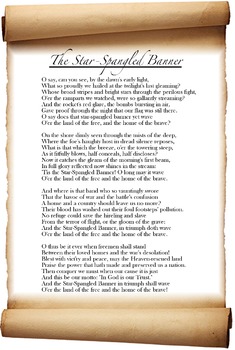

The Society commissioned a young church musician, John Stafford Smith, to compose music for their group. In 1766, a group of amateur musicians founded the Anacreontic Society (named in honor of the ancient Greek court poet Anacreon, who in the sixth century B.C., entertained his patrons with lyrical verse). Tune (1775) “The Anacreontic Song” by John Stafford Smith (1750–1836) This event inspired the words of Key’s poem originally titled, “The Defense of Ft. When “dawn’s early light” began to show, Kay was elated to see a large American flag waiving triumphantly over the fort. After the bombs subsided, in the dark of night, Key looked anxiously to the shore to try and determine the outcome of the conflict.

Key and Skinner had to watch helplessly as the British attacked Ft. 2 However, since the officers had openly discussed their war plans for attacking Baltimore, they had to detain Key and Skinner until the conflict was over. Beanes for his kind treatment, they relented. On September 3, 1814, Francis, along with American John Stuart Skinner, boarded a British war ship positioned near Baltimore and had dinner with two of the commanding officers.Īt first, the officers refused to release Beanes, but after Key and Skinner showed them letters from wounded British prisoners praising Dr. William Beanes, a popular physician, who was captured in his home and accused of aiding in the arrest of British soldiers. His assignment was to try and secure the release of his friend, Dr. Two years after the War of 1812 broke out (a war that began in part because Britain was supporting Indian tribes in order to prevent American expansion), Francis was sent on a diplomatic mission approved by President James Madison. He also enjoyed writing poetry in his spare time. 1 In the end, he chose to continue in law but serve as a lay leader in his church. Francis was a committed Christian, and at one point, he seriously considering entering ministry full-time. He studied law and served as the district attorney for the District of Columbia. Francis Scott Key was the son of an army officer who served with distinction in the Revolutionary War.


 0 kommentar(er)
0 kommentar(er)
